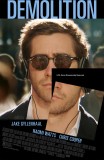Demolition Movie Review

Demolition is now available on home video. Read our review of the DVD.
 |
Demolition
Theatrical Release: April 8, 2016 / Running Time: 101 Minutes / Rating: R Director: Jean-Marc Vallée / Writer: Bryan Sipe Cast: Jake Gyllenhaal (Davis Mitchell), Naomi Watts (Karen Moreno), Chris Cooper (Phil Lincoln), Judah Lewis (Chris Moreno), C.J. Wilson (Carl), Polly Draper (Margot), Malachy Cleary (Davis' Dad), Debra Monk (Davis' Mom), Heather Lind (Julia Lincoln-Mitchell), Wass Stevens (Jimmy), Blaire Brooks (Amy), Ben Cole (Steven), Brendan Dooling (Todd) |
After directing two Oscar-winning performances in Dallas Buyers Club and two nominated ones in Wild, French-Canadian director Jean-Marc Vallée moves away from award season and from moving true stories to give us Demolition, It is no ordinary grieving process for the young widower, who can't summon any emotion over the tragedy even for public display. He quickly returns to work to the shock and horror of his colleagues, including his boss and former father-in-law Phil (Chris Cooper). Davis finds two unlikely ways to cope with the loss of his wife. He pens a series of revealing personal letters to the customer service department of the hospital vending machine that failed to deliver the bag of Peanut M&M's he paid for, correspondence that eventually earns him a phone call from Karen Moreno (Naomi Watts), the company's customer service rep. This launches an unusual friendship, as Davis keeps writing letters of no particular relevance to the vending company and even meets Karen on his daily train ride from White Plains to Manhattan.
The second source of comfort for Davis is disassembling things, starting with the leaky refrigerator his wife had gotten on him to repair. This interest develops into something of an obsession, as Davis begins pulling apart bathroom stalls at his workplace and any other appliance he can get his hands on. He even offers to pay a construction crew if they'll let him help demolish a house for them, a proposal they reluctantly and suspiciously accept as he buys new work clothes and overalls.
At his real job, Davis displays erratic behavior, coming and going to Phil's growing resentment. Phil can't even get Davis to sign off on the plan to establish a scholarship in his late daughter's name. Davis is more interested in Karen and her troubled, foul-mouthed 15-year-old son (Judah Lewis).
Gyllenhaal has shown real growth as an actor over the years, coming close to an Oscar nomination for 2014's Nightcrawler. Demolition appears to be his finest work to date, as he convinces you of his character's pain and inability to process it. On occasion, the movie is funny. More often, it is sincere and heartfelt, taking very seriously the situation of Davis, as he tries to grieve for a wife he's not sure he knew or loved. But the movie and Gyllenhaal still succeed at getting you to empathize with a character you probably shouldn't like. Watts is good in a role that keeps her off-screen as much as on. Cooper is powerful in conveying both his pain and his restraint. Lewis is promising for a newcomer who probably doesn't fit the mold for most teenaged actor roles. Vallée clearly lives up to his reputation for being able to bring good work out of his casts.
Seven months after premiering at the Toronto International Film Festival, Demolition finally opens in 550 theaters today, entirely freed of any expectations to extend Vallée's acting Oscar streak.
|
Related Reviews:
DVDizzy.com | DVD and Blu-ray Reviews | New and Upcoming DVD & Blu-ray Schedule | Upcoming Cover Art | Search This Site
DVDizzy.com Top Stories:
Now in Theaters: Everybody Wants Some!! • Midnight Special • Zootopia • Batman v Superman: Dawn of Justice
Jake Gyllenhaal: Southpaw • Accidental Love • Prisoners • Nightcrawler • Zodiac • Prince of Persia: The Sands of Time
Naomi Watts: St. Vincent • The Impossible • While We're Young • Adore | Chris Cooper: August: Osage County • The Company Men • The Muppets
Directed by Jean-Marc Vallée: Dallas Buyers Club
Greenberg • 99 Homes • Jeff, Who Lives at Home • Accidents Happen
Text copyright 2016 DVDizzy.com. Images copyright 2016 Fox Searchlight Pictures, Black Label Media, and Sidney Kimmel Entertainment. Unauthorized reproduction prohibited.
